So Where Are We Now?
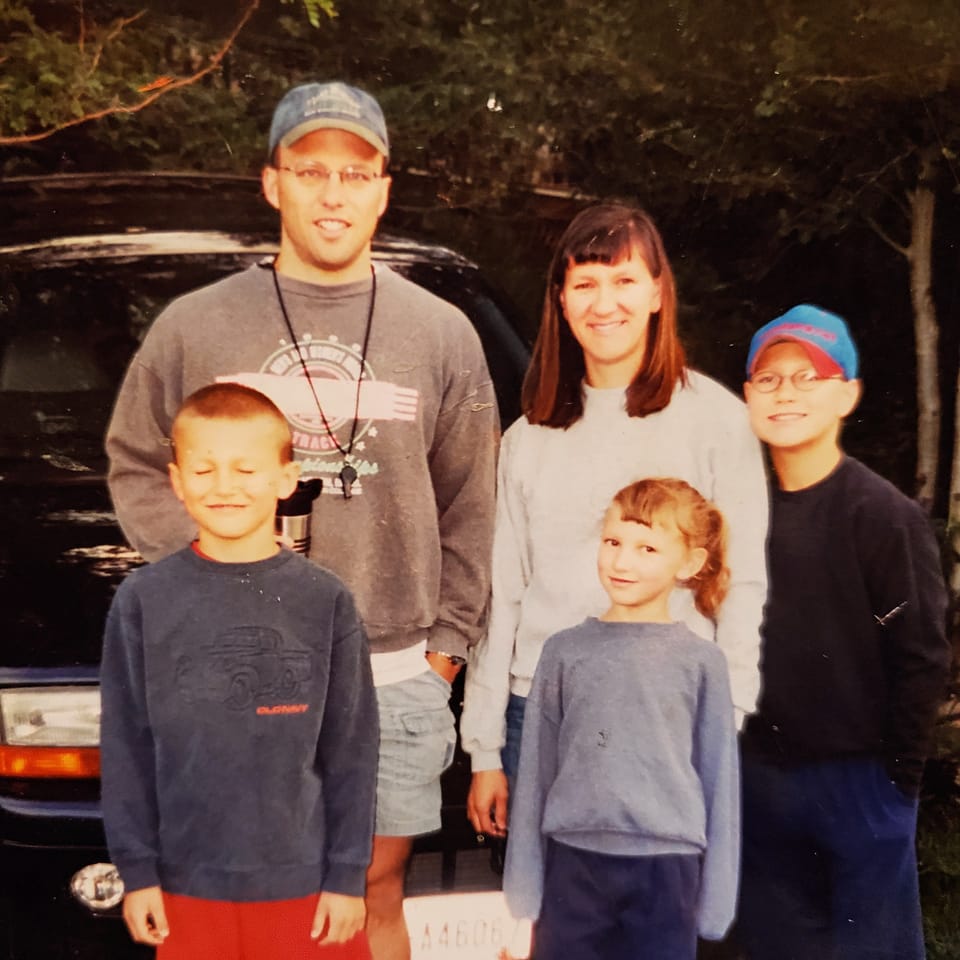
So, where are we now? I’m not really talking about time or place when I ask this question. Except when you are lost, geography is generally the easiest of answers: I am sitting at the kitchen table in my folks’ cabin, which lies nestled among the pines next to Rock Creek, whose headwaters are gathered from a large alpine basin that feeds Glacier Lake, some fifteen miles (as the crow flies) further upstream. Even this far down, its waters run icy-cold.
Geographically speaking, I sit seven miles southwest of Red Lodge, Montana. It is a sunny summer morning in mid-July, 2024. Geography is interesting, and important; it provides context. But it says nothing about who we are, or who we are becoming.
That’s what I’m considering here: Who am I becoming?
22 years ago in August (2002), I was packing up my family, getting ready to move cross-country, from Montana to Philadelphia. That’s us in the photo above. We look so young in that picture. I was making my first career change: out of software, into ministry, by way of seminary. It was a huge transition, full of sacrifice, fueled by the hope of making a difference in the lives of others. And I believed God had called us to this path. But that was before I nearly blew up my marriage, before the gospel really became good news to me, before I fell in love with pagans. There was so much more we still needed to learn.
18 years ago in September (2006), I was moving to Missoula for my first ministry assignment after seminary, about to cut my teeth pastorally by getting thrown into the deep end: starting a church, from scratch, for people who had given up on church – the unchurched, de-churched… the burned-by-church.
It would prove to be a very educational experience. I started writing long emails about what I was learning, thinking that friends from afar might value a candid, unvarnished, fly-on-the-wall perspective into the wild and wooly world of church planting. (Those of you who have followed along for any length of time know it can get very wooly indeed.)
Even back then, most Missoulians were decidedly over Christianity, often for legitimate reasons. You could say they were open to just about any religion, as long as it wasn’t Christianity. On Sundays, less than 10% of the city would be caught dead in a church; here we were, targeting that 90% who were unaffiliated (and not particularly interested in being reached).
Growth came very slowly.
Somehow, a church was born (ex-nihilo). We witnessed skeptical non-Christian friends begin reorienting their lives as followers of the biblical Jesus; we saw folks who had identified as Christians for years rediscover faith in a new and invigorating way. Seven years in, All Souls Missoula was a vibrant, thriving church of 80+ congregants. On a resume, it all reads like a resounding success – a triumphant testimony to the power of the gospel. Soli deo gloria!
Why then, are my recollections of this seven-year stint characterized almost entirely by pain, regret, failure?
Last month I ran into an old friend from seminary at a wedding in Pittsburgh. He asked about R, my co-pastor in Missoula: “How’s he doing? What is he up to these days?”
“I have no idea,” I replied (awkwardly). “I think he’s out of ministry now. We haven’t spoken for nearly a decade...”
Ouch.
Marilyn and I gave seven years of our lives for that church – like Jacob laboring for Rachel (Genesis 29) – but it feels like we have almost nothing to show for it. We seldom hear from the people we ministered to (or with) during that time; none of them talk to us anymore. I don’t even know if the church we founded there still exists.
So, yes… pain, regret, failure:
What did I do wrong?
What could we have done differently?
What’s to ensure it won’t happen again?
How can glory and trauma coexist?
These questions must be asked – they are being asked – by ministers and laity, by church-folk and (overwhelmingly) by folks who have left the church. If I’ve learned anything this past decade, it’s that experiences like ours in Missoula, along with all the feelings that ensue, are (unfortunately) shockingly ordinary and common. Lots of people are asking these questions, because they have experienced similar things in their churches.
So these questions much be considered.
But these questions must also be answered – geography is of little help here – and how we answer them (as well as the answers we give) will inevitably shape us.
That’s really what I’m after here: How am I being shaped? What is happening to the topography of my soul, as we experience all these ups and downs of life and faith and sin and death?
11 years ago this November (2013), we moved to Austin to try to plant another church, and to try to start a brewery – both from scratch, both at the same time. The decision to leave Montana was not driven by any disaffection with our church in Missoula. (The breakup would happen about six months after we landed in Austin). Rather, we came to Texas because we felt God calling us to keep planting churches – somewhere in the West, in a world class, culture-shaping city.
And this time, I felt compelled to try planting the church differently.
In Missoula, I observed that ministry has a way of sucking you in: when we started, I was neck-deep in non-Christians all week long; but five years later, I spent almost all my time with the 50-60 people who comprised my congregation. That’s not a bad thing – pastors are supposed to feed the sheep – but I found myself missing my interactions with seculars and skeptics, longing for a mode of ministry that would allow me to remain more deeply embedded in public space, in ways that non-Christians could appreciate even if they didn’t share my convictions about Jesus. Internally, I was withering.
I also noticed that the way we plant churches in America today depends heavily on money – we need mammon to fund our buildings, staff, and programming. Among church planters, funding (or lack thereof) is often cited as one of the biggest things holding back our ministry. Even pastors of established churches regularly mention finances as one of their biggest sources of anxiety.
(Thought experiment: if your church suddenly lost all its financial assets – its buildings, its budgets, its money to pay staff – what aspects of its ministry would continue to flourish even without funding? Perhaps that might be a better measure, a truer picture of what our churches really are…)
By all accounts, the earliest converts to Christianity were often poor, women, and slaves. Yet in spite of lacking money (for buildings, budgets and staff) or power (culturally) the early church experienced massive growth and flourished. What if there was a way for church plants to be less dependent on money? The Apostle Paul made tents to support himself financially… why couldn’t we?
So we moved to Austin to explore bi-vocational ministry – an unorthodox move in Presbyterian circles – to see if it was possible to start another church, while working fulltime jobs, with very little outside funding, right in the heart of a secular post-Christian city… all in a way that was emotionally healthy and sustainable. Once again, we have found ourselves in the deep end.
Over this past decade, God has (repeatedly) opened more doors we could have imagined, but in ways that were unexpected, which we would not have chosen for ourselves.
He has birthed another congregation, All Souls Church of Austin – this time in our living room (permanently, we hope). He has allowed us to start not one, but two brewpubs – both of which have been very well received (in a city that is not easily impressed).
Yet in spite of all progress, there have also been significant setbacks – at every turn, on every front.
As a church, we (still) barely exist; our congregation has turned over now nearly three times. Some people left because they moved away from Austin, but plenty moved on because they were unhappy with my leadership or felt like the church wasn’t measuring up to their expectations. (You’d be amazed at how many church-folks aren’t particularly interested in a house church).
Nevertheless, here we are (still). All Souls is growing (again). We do not require money to thrive (or survive). The unchurched and de-churched keep finding us – some Sundays we are busting at the seams. But there are key riddles that still need solving: How do we handle growth, across multiple living rooms, without losing the strengths and cohesion that come from smallness?
House churches are inherently fragile, always just a stone’s throw away from disaster. But the quality of life feels worth the precariousness. The church feels alive; I feel alive.
Lazarus has seen its share of ups and downs too – it is hard for any business to earn (and retain) customer loyalty. It is even harder to build (and keep) a great team, to run a tight ship, to pay the bills, to keep the lights on, to make everyone happy. When you succeed, everyone expects more of the same; when you experience adversity, everyone grumbles in the desert (Exodus 15:24).
Since COVID, it has gotten much more difficult to run a business.
So where are we now?
I was 33 when we went off to seminary; I was 37 when we landed in Missoula; I turned 45 that first spring in Austin; I turned 55 this past May. That's 22 years of serious terrain (and these old bones aren't getting any younger).
Who am I becoming?
How am I being shaped?
That’s what I’m working on this summer. Early on in ministry, I started journaling as part of my daily rhythm in word and prayer. I figured if I was going to be a pastor, I should probably practice thinking spiritual thoughts, and (while I was at it) I might as well try writing them down, just in case something I thought happened to be profound.
Over the first few weeks, I frequently caught myself posturing – writing for some future historian, who, after my death, gained access to my private journals to share my amazing insights with an audience of eager Christians who were all hungry to be more like me...
(Insert retching sound here.)
It was all vanity. I was writing to impress others (which is a waste of good journals). My content was inconsequential tripe. It took ages to fill up a journal. I wrote very little, because I felt it needed to sound profound – even back then I knew most of it didn’t.
Catching myself, I would consciously try a different tack – just writing what I thought. If something struck me as interesting, or raised a question, I jotted that down. Grammar and eloquence went out the window; stream of consciousness entered in. I started writing about what I was reading, what I was thinking, about problems in the church. I wrote about my hopes, my doubts, my fears, my anxieties. I wrote about my frustrations – with my marriage, with myself. I even started writing about my sin. (Ever notice how few biographers tell us about our faith-heroes' struggles with sin?)
Over time, several things happened.
First, words started pouring onto the pages. You write more freely when you’re not worrying about an audience.
Second, I began to notice a pattern. In my journaling, it wasn’t always clear whether I was talking to God or to myself, but sometimes I would get explicit and resort to writing things like, “WHAT ARE YOU TRYING TO SAY TO ME, LORD?!?” (This was usually in reference to some aspect of my life wasn’t going according to plan).
Often, those explicit questions would be followed or accompanied by a flurry of notes – sometimes a paragraph, sometimes pages – unexpected insights into the text I was studying, or a difficult situation I was trying to unravel.
One day it struck me: “Is God actually answering me, here?”
That's a tantalizingly unsettling idea. (Presbyterians get nervous when you start talking about “Hearing from God.”) These bursts of real insight occurred too frequently to be coincidental, but not often enough to function like some magic mirror on the wall. I wasn't entirely sure what to make of it, but from this point on, my journaling started to become more conversational.
I started writing as if I might actually be talking to God. I started listening as if he might actually be responding.
Third, I did not realize it at the time, but I was beginning to map the topography of my heart to all the various inflection points of my life. My journals are like tree rings now, records of how the external climate was shaping my spiritual interior at any given point in time.
I started journaling back in 2009.
For the first decade or so, I used these lovely little leather journals that were made in Italy – 120-page notebooks with lined paper that boasted deckled edges and a generous heft; they came with an owl embossed on the front; they practically begged you to think big thoughts and jot them down. At first, I purchased them from Barnes & Noble; later you could only find them on eBay. By the end of 2019, I couldn’t find my owl journals anywhere.
So I took the plunge and ordered a “Monastic Strap Classic Italian Leather Journal” (refillable!) from JournalsAndBooks.com. I also ordered a dozen 400-page refills, just to be safe.
Over these past 15 years, I have filled 23 owl journals, and 13 of the large refills.
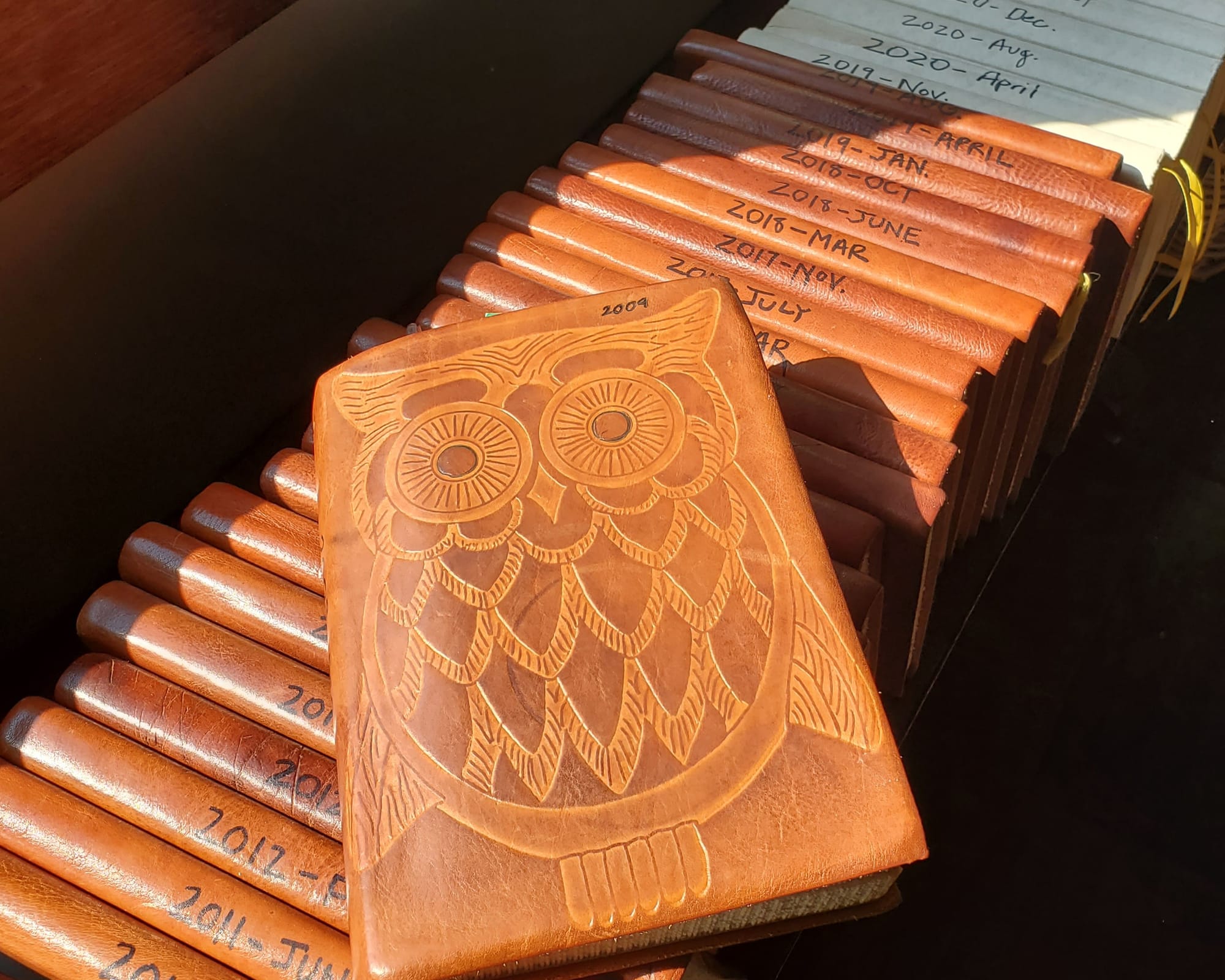
That’s nearly 8,000 pages of thoughts, notes, prayers, and petitions.
That’s a lot of tree rings.
My summer project is to re-visit them – to re-read all those old journals, to see what I thought (and felt) back then, to compare it with what I think (and feel) now. To see how this life has shaped me. Maybe to glimpse who I am becoming.
I undertake this task with reservation.
On the one hand, much of what I wrote is likely (still) drivel. But I know there are some parts worth highlighting, bookmarking – genuine insights which I now hold to be deep truths about God and life and the world and my place in it. I know there are things in here that I believe more deeply than ever. I’m looking forward to these parts.
At the same time, I have a deep sense of foreboding; I know that this trip down memory lane is going to require me to revisit some dark and painful places. All that pain, regret, failure... it's lurking in there (still), not fully tamed by the gospel (still). This project will require me to take yet another stab at dealing with it.
“Why on earth would you want to re-read all that old stuff?” says Jordan (my daughter-in-law).
There are just a handful of us left sitting in my living room. It’s Sunday afternoon, after worship, before my nap, the day before our big drive back to Montana.
“No, he has to!” says Reyna. She is new to All Souls, but well acquainted with grief and loss. She has been learning for a while now the value and importance of processing past trauma through the lens of the gospel.
I think she’s right. That’s where I’m headed this summer.
I am looking forward to the journey, to seeing where we are now…
[I'd love to hear where you are now, after all these years - hit reply & tell me!]


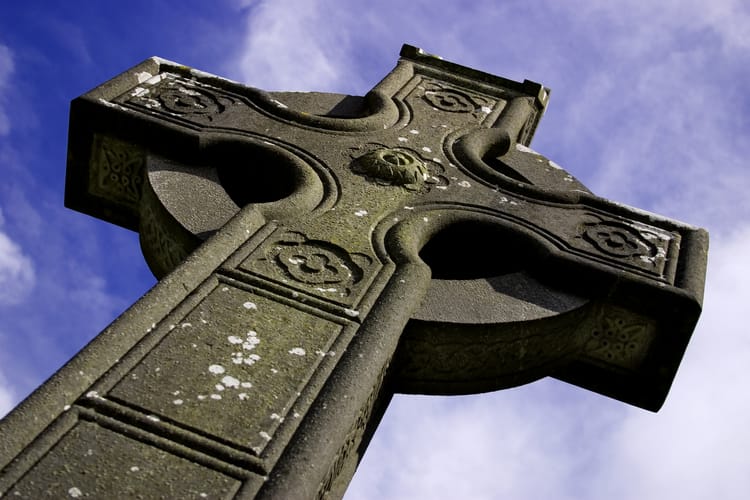

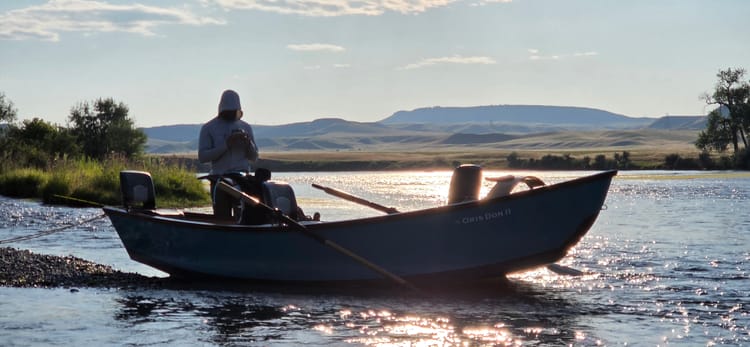
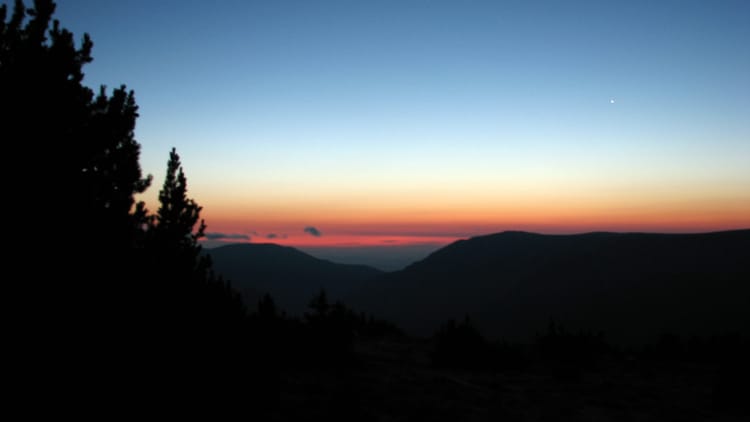
Member discussion